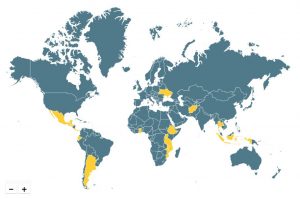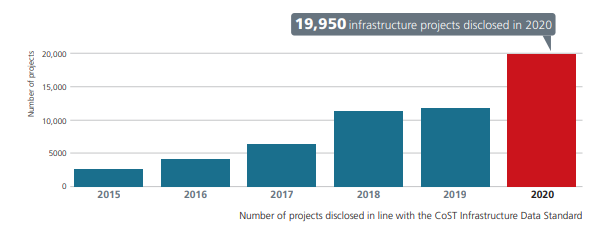Since the launch of CoST in 2012, we have seen the significant impact the initiative has had on providing better value for money from public infrastructure projects, with our story of change deepening at international and national levels.
change deepening at international and national levels.
Spreading CoST globally
Our current members span four continents and include five Fragile and Conflict-Affected States as well as low, middle and high-income economies, demonstrating the need and demand for infrastructure transparency in many different contexts.
Scaling up data transparency
Over recent years we have seen a leap in the number of infrastructure projects on which data has been disclosed in CoST countries. In 2017 CoST helped to disclose data on 6,356 projects which rose to 19,950 by 2021. This means that we have helped to raise data transparency on a total of nearly 60,000 projects worldwide. Through such transparency gaps in the data and key issues can be easily seen, helping the stakeholders we work with demand improvements.

Technology and innovative tools
Key to the increase in data disclosure has been the use of technology and innovative approaches taken by CoST members. To promote data publication of scale, almost all of our members have established online data disclosure platforms, such as the award-winning SISOCS in Honduras or West Lombok’s recently launch INTRAS.
The platforms use our globally recognised standards – either the CoST Infrastructure Data Standard (CoST IDS) or our more recent Open Contracting for Infrastructure Data Standard (OC4IDS), developed with Open Contracting Partnership. The standards have been recognised by the G20, the World Bank, Global Infrastructure Basel, BRI Monitor and others.
More on our tools can be found here.
Enabling systemic change

To support the CoST disclosure and other CoST processes we work to institutionalise infrastructure transparency through legal mandates. These are typically achieved by amending existing legislation or by ministerial decree and focus on obligatory data publication in line with CoST standards.
So far eight CoST members have established legal mandates on disclosure, with Malawi being the most recent to do so several others such as Panama and Ukraine signing commitments with government.
Such mandates encourage more data to be made public and entice those responsible for infrastructure delivery to take action to improve their sectors and rectify project issues.
International influencing

Collaboration with other advocates of open government is key to our success. In addition to partner collaboration to develop technology and innovative tools, we work with partners to highlight our message on an international stage. We regularly participate at the events of the World Bank, OECD, UNDP and we were delighted to Chair the C20 Infrastructure Working Group (IWG) in 2019 and 2020 – the core civil society group advocating to the G20.
We have spoken on the impact of the CoST approach at various open government and open data events – from amplifying the voice of women in rural Uganda to high-level panels at the International Anti-Corruption Conference to showcasing our tools at the International Open Data Conference.
Working with the private sector has seen us present at events such as PIARC Abu Dhabi 2019, outlining how CoST promotes road-sector integrity and at FIDIC Mexico 2019, where, following our participation the body endorsed the CoST approach on Anti-Corruption Day 2019 and asked us to present at a ‘recovering with integrity’ event to mark the day in 2020.
For more on our global impact download our: Annual Report 2020 | Annual Report 2019 | Annual Report 2018 | Annual Report 2017